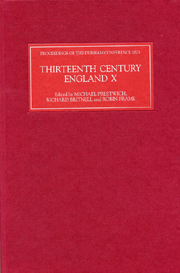Book contents
- Frontmatter
- Contents
- PREFACE
- ABBREVIATIONS
- The Meetings of Kings Henry III and Louis IX
- Counting the Cost: The Financial Implications of the Loss of Normandy
- Networks of Markets and Networks of Patronage in Thirteenth-Century England
- Three Alien Royal Stewards in Thirteenth-Century England: The Careers and Legacy of Mathias Bezill, Imbert Pugeys and Peter de Champvent
- The Eyre de terris datis, 1267–1272
- Joan, Wife of Llywelyn the Great
- Town and Crown: The Kings of England and their City of Dublin
- English Landholding in Ireland
- The Reception of the Matter of Britain in Thirteenth-Century England: A Study of Some Anglo-Norman Manuscripts of Wace's Roman de Brut
- Fearing God, Honouring the King: The Episcopate of Robert de Chaury, Bishop of Carlisle, 1258–1278
- Cloistered Women and Male Authority: Power and Authority in Yorkshire Nunneries in the Later Middle Ages
- Taxation and Settlement in Medieval Devon
- Clipstone Peel: Fortification and Politics from Bannockburn to the Treaty of Leake, 1314–1318
- Royal Patronage and Political Allegiance: The Household Knights of Edward II, 1314–1321
- ‘Edward II’ in Italy: English and Welsh Political Exiles and Fugitives in Continental Europe, 1322–1364
The Reception of the Matter of Britain in Thirteenth-Century England: A Study of Some Anglo-Norman Manuscripts of Wace's Roman de Brut
Published online by Cambridge University Press: 12 September 2012
- Frontmatter
- Contents
- PREFACE
- ABBREVIATIONS
- The Meetings of Kings Henry III and Louis IX
- Counting the Cost: The Financial Implications of the Loss of Normandy
- Networks of Markets and Networks of Patronage in Thirteenth-Century England
- Three Alien Royal Stewards in Thirteenth-Century England: The Careers and Legacy of Mathias Bezill, Imbert Pugeys and Peter de Champvent
- The Eyre de terris datis, 1267–1272
- Joan, Wife of Llywelyn the Great
- Town and Crown: The Kings of England and their City of Dublin
- English Landholding in Ireland
- The Reception of the Matter of Britain in Thirteenth-Century England: A Study of Some Anglo-Norman Manuscripts of Wace's Roman de Brut
- Fearing God, Honouring the King: The Episcopate of Robert de Chaury, Bishop of Carlisle, 1258–1278
- Cloistered Women and Male Authority: Power and Authority in Yorkshire Nunneries in the Later Middle Ages
- Taxation and Settlement in Medieval Devon
- Clipstone Peel: Fortification and Politics from Bannockburn to the Treaty of Leake, 1314–1318
- Royal Patronage and Political Allegiance: The Household Knights of Edward II, 1314–1321
- ‘Edward II’ in Italy: English and Welsh Political Exiles and Fugitives in Continental Europe, 1322–1364
Summary
For students of literature and history alike, the rise in popularity of the Matter of Britain following the publication in 1135–8 of Geoffrey of Monmouth's Historia Regum Britannie is an important and far-reaching phenomenon. Geoffrey's work, which had initially met with some scepticism in scholarly circles (as may be seen from William of Newburgh's virulent attack on its reliability), had by the end of the twelfth century attained academic respectability, an acceptance reflected in the fortunes of Wace's translation into French verse of the Historia Regum Britannie, the Roman de Brut, completed in 1155. Nowadays, the Roman de Brut is studied mainly by literary scholars but, to a great extent, current perceptions of the poem are anachronistic. In the twelfth century, the term ‘roman’ referred to any text (particularly adaptations from the Latin) in a vernacular language, and did not necessarily indicate ‘literariness’, while verse was a medium used in a range of twelfth-century French vernacular works, including medical textbooks. Wace's Roman de Brut presents itself from the outset as a truth-bearing, historical narrative, based on an original which required translating (i.e. from Latin):
Ki vult oïr e vult saveir De rei en rei e d'eir en eir Ki cil furent e dunt il vindrent Ki Engleterre primes tindrent, Quels reis i ad en ordre eü Ki anceis e ki puis i fu, Maistre Wace l'ad translaté Ki en conte la verité. […]
Whoever wishes to hear and to know about the successive kings and their heirs who once upon a time were the rulers of England – who they were, whence they came, what was their sequence, who came earlier and who later – Master Wace has translated it and tells it truthfully.
- Type
- Chapter
- Information
- Thirteenth Century England XProceedings of the Durham Conference, 2003, pp. 131 - 146Publisher: Boydell & BrewerPrint publication year: 2005



